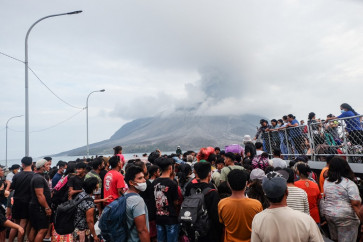Blurred lines over interfaith unions
A meeting of leaders from several religious groups provided no definite opposition Friday to people of different faiths from marrying without having to convert
Change Size

A
meeting of leaders from several religious groups provided no definite opposition Friday to people of different faiths from marrying without having to convert.
The groups participating in the meeting, which was held at the headquarters of the Indonesian Ulema Council (MUI) in Central Jakarta, comprised the MUI, the Indonesian Communion of Churches (PGI), the High Council of Confucianism in Indonesia (Matakin), the Council of Buddhist Communities (Walubi), the Bishops Council of Indonesia (KWI) and the Indonesian Hindu Religious Council (PHDI).
After the meeting, the groups concluded that they supported religious wedding ceremonies in uniformity and considered marriages as sacred, although they also said that interfaith marriages should be registered.
They also discussed the rights to procreate and form a family through a legitimate marriage as stipulated by the Constitution, the Marriage Law and the Civil Administrative Law.
However, the groups did not provide a firm conclusion as to whether they rejected interfaith marriages or endorsed them.
They argued that they did not want to enter into such a debate as such marriages included a number of aspects not limited within religion or the law, such as considerations of the values of Pancasila (the philosophical foundation of the Indonesian state).
- MUI hosts meeting with groups representing all of RI's official religions
- No formal opposition to interfaith marriage, but no ringing endorsement either
- The groups said they would support whatever decision MK makes in Marriage Law review
'We can tolerate the reality [of interfaith unions]. But such a reality should not give birth to permissiveness,' said the MUI's head of interfaith relations, Slamet Effendi Yusuf.
The meeting was convened in response to a recent move by four graduates and a student from the University of Indonesia's school of law to file a judicial review request with the Constitutional Court (MK) questioning an article in the Marriage Law that, they argue, creates challenges for citizens of different religions to marry.
They maintain that Article 2, Clause 1 of Law No. 1/1974 on marriage forces everyone to apply religious teachings in order to get married.
The legal provision defines a marriage as legitimate only if it is conducted in line with the rituals of the religion to which both the bride and groom adhere.
However, a Supreme Court decision in 1986 allowed a couple who followed different religions to get married, arguing that their differences in faith should not be an obstacle.
The court also found that a number of interfaith marriages existed and that some Islamic schools and Christian churches tolerated such practices, although they stopped short of endorsing them.
According to Slamet, his office had conducted a study and found interfaith unions existed, some of which had ended badly.
'The spread of such marriages would disturb the harmony in society,' he said. 'Therefore, religious figures have agreed that they need to maintain religion as the primary element in marriages.'
The religious groups also reminded the public about the importance of religious uniformity in marriages, as Indonesia retained the link between the state and religious values.
The PGI's Jerry Sumampouw said the communion of churches allowed its members to make individual decisions on the matter, although some churches allowed interfaith marriages.
'Interfaith marriages are possible, but such marriages should not be entered into lightly.'
Jerry added that Indonesia could not be equated with secular Western countries.
In conclusion, the religious groups said they would respect whatever decision the Constitutional Court made following its judicial review.
'I believe the court will be wise in determining its ruling by considering [this country's] history, the future and the fact that this is a Pancasila state, not a country that disregards religion,' Slamet said.









